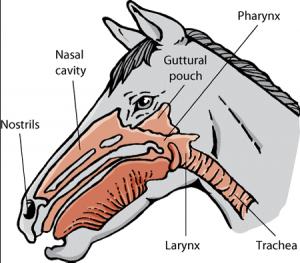By Elaine Haw, DVM, Full Circle Equine Services
Currently, Upper Respiratory Tract Infections seem to be at their peak in our Mid-South equine population. The symptoms are very similar to the ones you see/feel in a human upper respiratory infection, such as coughing, nasal drainage, lethargy/dullness, fever, and decreased appetite. As soon as you notice these symptoms, the horse should be separated from the rest of the herd to help prevent spread of the infection. It is also wise to treat, water, feed and hay the sick horse last so you are not contaminating the healthy horses by spreading the infection on your hands/clothes.
Unfortunately, there are many different causes of a respiratory tract infection including viral, bacterial, fungal, and parasitic. (Sometimes multiple types of infections may be present.) Therefore, the cause needs to be determined before initiating treatment. It is important to contact your equine veterinarian. The proper diagnostics can be performed in order to initiate the proper treatment.
According to a study conducted by the University of California, Davis, the top three most prevalent causes of equine upper respiratory infections are Equine herpes virus-4 (EHV-4/Rhino), Equine influenza virus (Flu) and Streptococcus equi (Strangles).
Equine herpes virus-4 (EHV-4) has been found to be the most common cause of these infections. Fall and winter are the peak times for EHV-4 infection. Equine influenza virus is the second most common finding, peaking in winter and spring. In third place is Streptococcus equi (Strangles), also most commonly found in winter and spring. All of these pathogens are not only extremely contagious, but also can cause your horse to become very sick, requiring medical treatment.
In the study, many of the infected horses were vaccinated at some point against these pathogens, but had incomplete vaccination records, indicating the horses were not vaccinated on a regular basis.
It is extremely important to discuss your horse’s vaccination needs with your equine veterinarian! Your horse’s age, vaccine history, and travel plans play a key role in determining which vaccines your horse needs and when they should be given for best results. Vaccines may not completely prevent infection, but will certainly reduce the level of sickness your horse experiences (also reducing vet/medical bills.)
Currently, Upper Respiratory Tract Infections seem to be at their peak in our Mid-South equine population. The symptoms are very similar to the ones you see/feel in a human upper respiratory infection, such as coughing, nasal drainage, lethargy/dullness, fever, and decreased appetite. As soon as you notice these symptoms, the horse should be separated from the rest of the herd to help prevent spread of the infection. It is also wise to treat, water, feed and hay the sick horse last so you are not contaminating the healthy horses by spreading the infection on your hands/clothes.
Unfortunately, there are many different causes of a respiratory tract infection including viral, bacterial, fungal, and parasitic. (Sometimes multiple types of infections may be present.) Therefore, the cause needs to be determined before initiating treatment. It is important to contact your equine veterinarian. The proper diagnostics can be performed in order to initiate the proper treatment.
According to a study conducted by the University of California, Davis, the top three most prevalent causes of equine upper respiratory infections are Equine herpes virus-4 (EHV-4/Rhino), Equine influenza virus (Flu) and Streptococcus equi (Strangles).
Equine herpes virus-4 (EHV-4) has been found to be the most common cause of these infections. Fall and winter are the peak times for EHV-4 infection. Equine influenza virus is the second most common finding, peaking in winter and spring. In third place is Streptococcus equi (Strangles), also most commonly found in winter and spring. All of these pathogens are not only extremely contagious, but also can cause your horse to become very sick, requiring medical treatment.
In the study, many of the infected horses were vaccinated at some point against these pathogens, but had incomplete vaccination records, indicating the horses were not vaccinated on a regular basis.
It is extremely important to discuss your horse’s vaccination needs with your equine veterinarian! Your horse’s age, vaccine history, and travel plans play a key role in determining which vaccines your horse needs and when they should be given for best results. Vaccines may not completely prevent infection, but will certainly reduce the level of sickness your horse experiences (also reducing vet/medical bills.)









